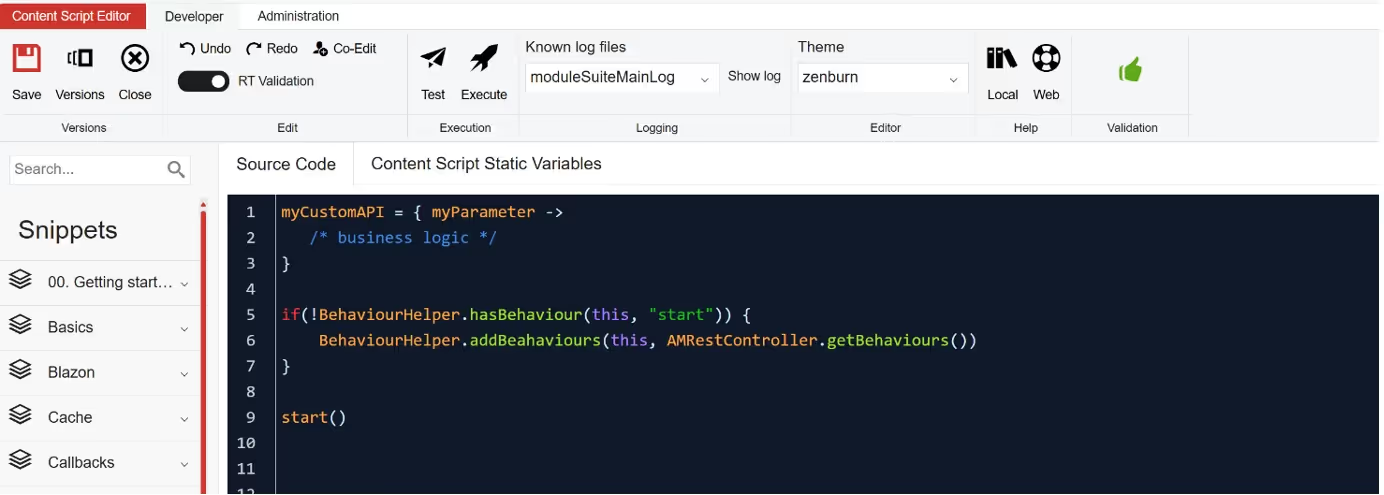Extending OpenText Content Management APIs with Module Suite

OpenText standard APIs provide a solid foundation for system integration. Module Suite APIs complement them by simplifying complex logic, improving resilience, and reducing maintenance. Together, they enable faster projects, smoother migrations, and lower total cost of ownership. Learn how combining both approaches delivers more effective, future-proof integrations.
Table of contents
OpenText Content Management provides a comprehensive set of standard APIs designed to integrate the platform with external applications and services. These APIs are robust, well-documented, and essential for enabling interoperability within complex IT ecosystems.
However, in many projects, relying solely on the standard APIs can place a significant burden on external development teams and lead to higher implementation and maintenance costs. This is where Module Suite APIs come into play as a complementary layer that simplifies, accelerates, and strengthens integrations.
Here are some of the key advantages of using custom APIs created with Module Suite:
1. Decoupling and simplified integrations
With standard APIs, an external application might need to chain together dozens of calls to achieve a single outcome. This requires external developers to understand OpenText’s internal mechanisms and to take responsibility for implementing the business logic needed to orchestrate those calls within the external application.
With Module Suite, the same outcome can often be achieved with a single API call. All the complexity - data orchestration, business logic, validations - remains inside OpenText, not in the external application. This:
- Keeps accountability within the OpenText + Module Suite stack;
- Reduces the number of system calls (less message traffic);
- Minimizes training and knowledge transfer for external teams;
- Lowers the total cost of ownership.
2. Built-in resilience, error handling, and rollback
When integrations rely on multiple chained API calls, handling errors becomes complex. A failure halfway through can leave systems in an inconsistent state.
Module Suite APIs allow transactions to be wrapped inside a single call, making roll back and error management more straightforward and robust. Errors are handled with contextual awareness within OpenText, and meaningful messages are returned to the caller - eliminating the burden of remote error handling for external systems.
3. Supporting legacy system replacements
During system migrations, external applications often rely on legacy APIs. Module Suite can expose APIs that mimic the same signature (function names, parameters, and types) of those legacy endpoints.
This means external systems can continue calling the same function without any code changes — just a configuration update to point to the new endpoint. This approach makes migrations to OpenText transparent to the wider ecosystem, significantly reducing disruption and cost.
4. Compliance, logging, and governance
By encapsulating business logic within the OpenText + Module Suite layer, organizations gain greater control over logging, auditing, and compliance. API calls can be logged centrally, limits enforced, and external usage tracked - all without relying on external applications to implement these controls.
5. Ease of development
Creating a new API with the Module Suite is remarkably straightforward. Regardless of how complex the business logic might be, the process itself is simple: developers just need to create a Content Script, place it in the designated volume (ContentScriptVolume→ CSServices), write as little as four lines of code and add the required business logic.
Once deployed, the new API is instantly available through a REST API call, for example:
{{baseUrl}}/amcsapi/v1/{{Content_Script_Name}}/myCustomAPI/myParameterThis means teams can expose custom logic as standard REST APIs in a matter of minutes, while automatically leveraging OpenText’s native permission model, roles, and audit capabilities.

An effective hybrid approach to APIs
OpenText standard APIs remain a powerful foundation for system integration. But by combining them with Module Suite APIs, organizations gain a complementary toolset that makes integrations simpler, more resilient, and easier to maintain.
For example, in a recent “move & modernize” project, customer data had to be migrated from a legacy system into OpenText Content Management. OpenText Magellan was used to extract and normalize the data, while the business logic for creating, structuring, and enriching containers, metadata, and documents was encapsulated within Module Suite APIs. Magellan invoked these APIs through simple signatures, passing full payloads of information. The custom APIs then handled rollback, resilience, logging, and process optimization directly within OpenText.
At the same time, for simpler operations such as creating folders or adding documents, Magellan leveraged the standard OpenText Content Management APIs. By combining customAPIs for complex business logic with standard APIs for atomic tasks, we delivered a resilient, cost-efficient, and fast migration.
If you’d like to learn more about how Module Suite APIs can complement your OpenText ContentManagement integrations, don’t hesitate to contact us - we’ll be happy to share insights and real-world examples.




150+
Success stories
We draw on a spotless track record of hundreds of successful transformations across OpenText and Salesforce platforms, creating future-ready digital ecosystems.
"Thanks to our partners' dedication and expertise, the solution provided to the EEAS offers flexibility within the stringent confines of EU regulations we were looking for. This adaptation not only complements our mission but significantly boosts our operational capabilities, greatly helping our global diplomatic activities."